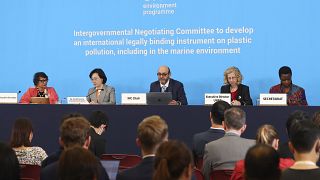plastic waste
A new study by the University of Leeds, published in the journal Nature on Wednesday, has found that the world creates 57 million tonnes of plastic pollution every year.
It spreads from the deepest oceans to the highest mountaintop to the inside of people's bodies, and more than two-thirds of it comes from the Global South.
Researchers used AI to model waste management in more than 50,000 municipalities around the world.
This allowed the team to predict how much waste was generated globally and what happens to it.
The researchers examined plastic that goes into the open environment, not plastic that is taken to landfills or is properly burned.
They said that for 15 per cent of the world's population, governments fail to collect and dispose of waste.
This is a big reason why Southeast Asia and Sub-Saharan Africa produce the most plastic pollution, with Nigeria’s Lagos emitting the most of any city.
The other biggest plastic polluting cities are New Delhi in India, Angola’s capital, Luanda, Karachi in Pakistan, and Egypt’s Al Qahirah.
Nigeria is also one of two African countries in the top 10, sitting at number 2, with the Democratic Republic of Congo at number 10.
According to the study’s data, the top eight nations are responsible for more than half of the globe's plastic pollution.
Lead researcher, Dr Costas Velis, from Leeds’ School of Civil Engineering said the world needs to start focusing more on tackling uncollected waste.
“We shouldn't put the blame, any blame, on the Global South,and we shouldn't praise ourselves about what we do in the Global North in any way,” he said.
Velis said it was just a lack of resources and ability of governments to provide the necessary services to citizens.
Researchers say the study shows that access to waste collection should be seen as a basic necessity, and a vital aspect of sanitation, alongside water, and sewerage services.
The United Nations projects that plastics production is likely to rise from about 440 million tonnes a year to more than 1,200 million tonnes, saying “our planet is choking in plastic”.











01:00
Renewed calls to end plastic pollution on World Environment Day
Go to video
World Bee Day: bees under threat, but solutions exist, report finds
02:16
Earth Day: Fighting microfibre pollution one laundry at a time
02:02
New report finds only seven countries met world clean air standards in 2024
Go to video
Legal proceedings against Shell for oil pollution impacting Nigeria
01:00
Bright red river outside Buenos Aires sparks fears of pollution